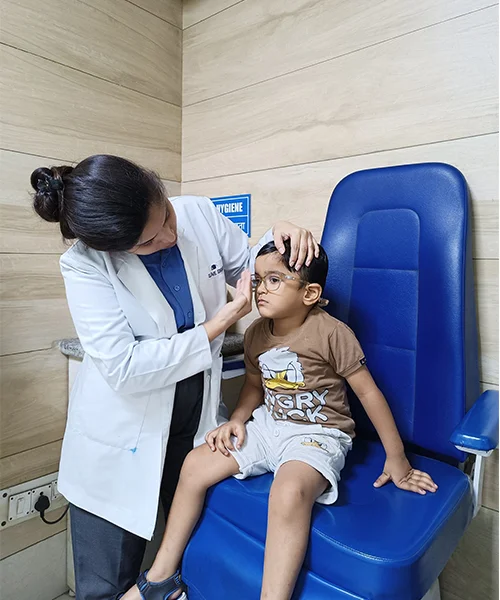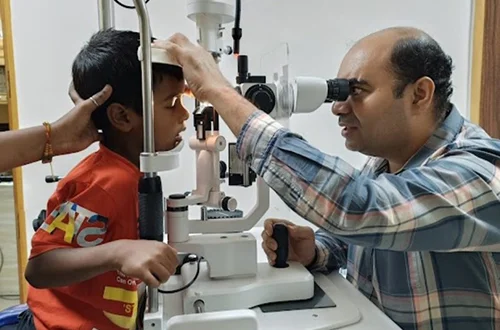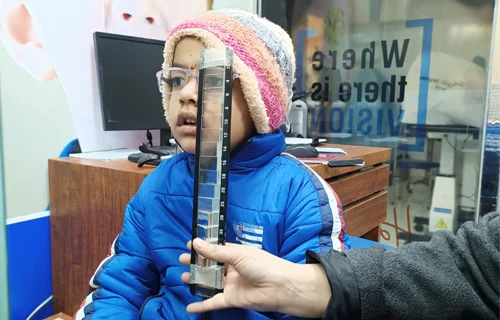Pediatric ophthalmology is a specialized medical field that focuses on the eye health and vision care of infants, children, and adolescents. Padiatric ophthalmologist diagnoses, treats, and manages pediatric eye problems.
They focus on child below 15 years age, who are in developing years of life, vision during period not only affect them personally but also have impact on their education and social upliftment.
When it comes to your child's vision health, choosing the right eye doctor is crucial. Your child's eyes are precious, and ensuring they receive the best possible care is essential for their overall well-being.

Consult now with the specialist of Save Sight Centre:
| Doctor's Name | Specialization | OPD Days | Timings |
|---|---|---|---|
| Dr. Amit Singhal | Pediatric Ophthalmology, Squint & Cataract | 2nd and 4th Saturday of Every Month | 9:00 AM TO 5:00 PM |
Eye problems in children can be a source of concern for parents, but understanding their causes and preventive measures can help ensure your child's eye health. From common issues like refractive errors to more serious conditions, being informed is key to protecting your child's vision.
Prevention: Refraction problems can be detected early with regular eye exams. To lower myopia risk, encourage your child to take screen time breaks, use correct lighting when reading or studying, and play outside.
Prevention: Preventing persistent vision loss requires early detection and treatment. Your youngster needs regular eye exams and prompt amblyopia treatment. Vision treatment or patching the stronger eye helps strengthen the weaker eye.
Prevention: Preventing strabismus is difficult, but early management can reduce vision difficulties. If your child frequently squints or tilts their head, see an eye doctor.
Prevention: Encourage frequent handwashing and not touching the eyes to prevent conjunctivitis. Identify and reduce allergens for your child with allergic conjunctivitis.

The below are the situation when you would know that it’s time to bring your child to see an eye doctor.

- Regular annual eye exams are recommended to detect concerns early, even if none are obvious.
- Schedule an appointment if you see any of the behavioral symptoms described.
- Ensure your child receives an eye test before school to address potential learning concerns.
- If there is a family history of eye issues, more frequent check-ups may be essential.
- Emergency medical attention is necessary for children with eye injuries to prevent long-term harm.

The importance of nutrition in maintaining and improving your child's vision. Here are some key points to consider.
 Important Nutrients for Healthy Vision
Important Nutrients for Healthy Vision
Children's vision therapy improves vision skills and corrects vision issues. I'm an eye doctor, so let me explain vision therapy and its uses. Vision therapy strengthens the eyes through exercises. Though similar to physical therapy, it targets the eyes and brain. The goal is to increase eye coordination and brain visual processing.
Vision therapy can effectively treat a variety of visual conditions in children, including:
Ans: A pediatric eye doctor, or ophthalmologist, diagnoses and treats children's eye diseases. They specialize in pediatric eye health.
Ans: Pediatricians can treat basic health issues, but they may not be trained to treat complex eye diseases. For eye concerns, see a pediatric ophthalmologist or optometrist.
Ans: The optometrist can address typical eye health issues. Pediatric ophthalmologists are ideal for complex eye diseases in youngsters.
Ans: A child's eye test typically includes checking visual acuity, eye alignment, eye movement, and examining the overall health of the eyes. This can be done through simple tests like reading an eye chart or more specialized exams for children unable to read.
Ans: Pediatric orthoptics is a branch of eye care that focuses on diagnosing and treating eye movement disorders and conditions like strabismus (crossed or misaligned eyes). Orthoptists are specialists who work with pediatric ophthalmologists to help manage these issues.
Ans: Signs of vision loss in children may include squinting, frequent eye rubbing, holding objects very close or far away to see them, unusual eye movements, sensitivity to light, and complaints of blurred or double vision. If you notice these signs, consult a pediatric eye specialist promptly.
Copyright © 2025 | Save Sight Centre | All Rights Reserved.